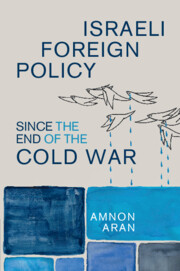Book contents
- Israeli Foreign Policy since the End of the Cold War
- Cambridge Middle East Studies
- Israeli Foreign Policy since the End of the Cold War
- Copyright page
- Dedication
- Contents
- Maps
- Figures
- Acknowledgements
- Chronology
- Abbreviations
- Maps
- Introduction
- 1 Entrenchment
- 2 Redirection
- 3 On the Brink of Peace?
- 4 Engagement Incomplete
- 5 Engagement under Assault
- 6 The Dividends of Engagement
- 7 Unpicking the Oslo Accords
- 8 Backtracking
- 9 Just Beyond Reach
- 10 Between Engagement and Unilateralism
- 11 In Search of a Foreign Policy Paradigm
- 12 A Perfect Storm
- 13 The Road Map for Regime Change
- 14 The Resurgence of Unilateralism
- 15 Events Dear Boy, Events
- 16 The End of the Road
- 17 Vulnerable Ties
- Epilogue: Israel’s Wondrous Decade?
- Appendix List of Persons Interviewed
- References
- Index
- Books in the Series
3 - On the Brink of Peace?
Published online by Cambridge University Press: 15 December 2020
- Israeli Foreign Policy since the End of the Cold War
- Cambridge Middle East Studies
- Israeli Foreign Policy since the End of the Cold War
- Copyright page
- Dedication
- Contents
- Maps
- Figures
- Acknowledgements
- Chronology
- Abbreviations
- Maps
- Introduction
- 1 Entrenchment
- 2 Redirection
- 3 On the Brink of Peace?
- 4 Engagement Incomplete
- 5 Engagement under Assault
- 6 The Dividends of Engagement
- 7 Unpicking the Oslo Accords
- 8 Backtracking
- 9 Just Beyond Reach
- 10 Between Engagement and Unilateralism
- 11 In Search of a Foreign Policy Paradigm
- 12 A Perfect Storm
- 13 The Road Map for Regime Change
- 14 The Resurgence of Unilateralism
- 15 Events Dear Boy, Events
- 16 The End of the Road
- 17 Vulnerable Ties
- Epilogue: Israel’s Wondrous Decade?
- Appendix List of Persons Interviewed
- References
- Index
- Books in the Series
Summary
Chapter 3 examines the evolution of Israel’s foreign policy of engagement under the Rabin government. It explains why the Israel-PLO and Israel-Syria peace processes remained contested, while Israel’s negotiations with Jordan yielded a peace accord. The chapter uncovers the deepening tension between the government pursing Israel’s policy of engagement and the domestic opposition it unleashed. It concludes that Israel’s foreign policy transition from entrenchment to engagement remained reversible. On the one hand, Israel concluded a peace agreement with Jordan, continued negotiations with the PLO and Syria, and engaged in budding negotiations with Arab countries in the Gulf and the Maghreb. On the other, however, nearing the brink of peace obscured a less visible, but highly significant fact, namely, that the Arab-Israeli peace process was enfeebled by domestic challenges. These included, for example, the deadly terrorist attacks launched by Hamas, hostile public opinion, and mounting political opposition in parliament on the grounds that engagement posed security risks to Israel and was anathema to its Jewish and Zionist identity of the state.
- Type
- Chapter
- Information
- Israeli Foreign Policy since the End of the Cold War , pp. 59 - 86Publisher: Cambridge University PressPrint publication year: 2020

